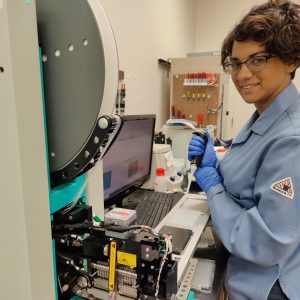
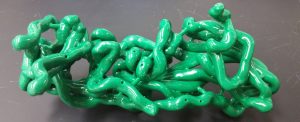
Services
- Consultation and technical assistance
- Evaluation of sample via Dynamic Light Scattering
- Automatic setup of crystallization conditions at 4° and 20° C
- Storage of plates at 4° and 20° C
- UV/vis microscope identification of organic and inorganic crystals.
- Optimization of crystallization conditions
- Training of students
- 3D Print Prototyping (See this page for inquiries)
Expectations
In order to ensure quality, kits are dispensed as needed. While walk-ins are welcome, appointments will be given priority. Walk-ins can expect a variety of broad screens to be available, but if something specific is required, make an appointment. Trip scheduling, randomized spikes in popularity, and back-orders affect inventory, so check if you need a specific screen. If it is not back-ordered it will be made ready in 24 hours. Over 30 labs are served. You are not guaranteed an appointment. If no time slots are available we will schedule your appointment for the next available slot, since this will affect the quality of service provided to others. Hours of operation are between 8:00 AM and 3:00 PM.
We understand that samples may misbehave. Solubility and stability issues are common problems for our users. If this happens, please email Génesis Falcon at ucla.xtal.facility@gmail.com with an estimate of when you may be ready or an appointment cancellation. Do not show up late with sample that is unstable needing immediate attention. You may arrive in the middle of another appointment and your sample may go to waste. For unstable samples, it is also a good idea to leave me a way to get a hold of you quickly if the sample becomes unmanageable during the experiment. Some samples form solid gels. Others deposit inconsistently when unconventional solubilizing agents or dyes are used. If you are unreachable, we will proceed with the experiment using our best judgement. Also understand that other users have to troubleshoot and may run a bit late. If you have an unstable sample that will not last five minutes in solution, email Génesis Falcon at ucla.xtal.facility@gmail.com to make sure everything is ready before you dissolve your sample.
Internal users: If your recharge number changes, please notify Génesis Falcon ASAP.
General Setup
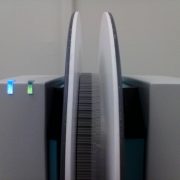
As part of the X-ray and EM Structure determination core we have a laboratory dedicated to sample preparation and crystal screening . We have a large library of commercial kits on hand.
SPT LabTech Mosquito nanoliter-scale liquid handlers generate hanging and sitting drop crystallization experiments.
The three-drop pattern requires 40 ul of sample and produces 288 unique conditions 210 nl each. For initial screening we typically recommend a three-drop pattern that varies protein:chemical concentration to increase the chance of obtaining crystals.
After a sample is received it is prepared immediately. A total of 2,880 conditions only requires 400ul of sample.
The minimum volume required to set up a single drop experiment is 15 uL (100nl sample: 100nl crystallant).
A basic requirement for macromolecular crystallization is sample purity better than 98% as detected by SDS gel and/or Mass Spectroscopy. The presence of secondary bands in the gels or other contaminants will decrease the success rate. The optimal protein concentration is around 10 mg/ml but other concentrations can be accepted as long as the technical staff is notified. The normal turn around is 24 hours. Special optimization conditions may require more time. We recommend to filter the sample shortly before the crystallization trials starts.
Instrumentation
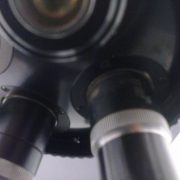
- WYATT DynaPro Plate Reader II for evaluation of sample prior to setting crystallization plates.
- SPTLabTech Mosquito nanodispenser robot capable of setting hanging and sitting drops at a rate of 288 conditions every 2.9 minutes.
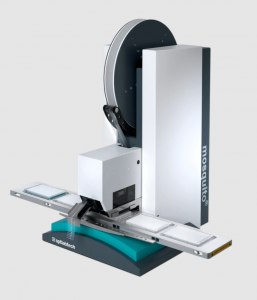
- Octet RED96 for measuring concentration of proteins and other biomolecules, measuring kinetics and affinity, and screening protein-protein and protein-small molecule interactions.
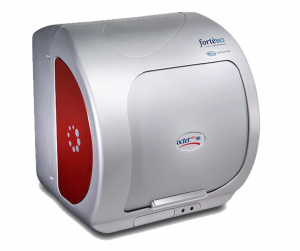
- Echo 525 acoustic liquid handler for aqueous-based acoustic transfers.
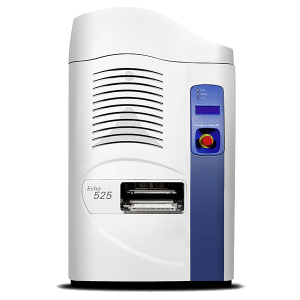
- Tecan Genesis 200 to prepare crystallization kits and to generate optimization conditions.
- Korima PRS-1000 UV microscope capable of distinguishing organics from salt crystals.
- Emerald BioSystems Crystal Monitor microscope workstation with automated image capture.
- Formlabs Form 2 3D Resin Printer
- Airwolf 3D HDR Filament Printer
- Commercial Screen Formulations available in 96 well format.
Contact
Génesis Falcon
ucla.xtal.facility@gmail.com
Boyer Hall 106, 611 Young Drive East, Los Angeles, CA 90095
The Sample Preparation and Crystal Screening Laboratory in BH-106 is open from 9:00 am to 3:00 pm Mon-Fri, excluding holidays.
Gene to Structure Partnership
The Crystallization Core collaborates with the Protein Expression Core and X-ray Crystallography Core to offer the advanced technology and expertise our users rely on.
Fee Structure
The crystallization facility at UCLA is funded by the DOE and is the most cost-efficient means of high-throughput screening in the United States.
Internal UCLA researchers:
Crystallization tray with 96 commercial solutions, 3 drop experiment, 288 conditions: $35
External researchers:
Crystallization tray with 96 commercial solutions, 3 drop experiment, 288 conditions: $40


